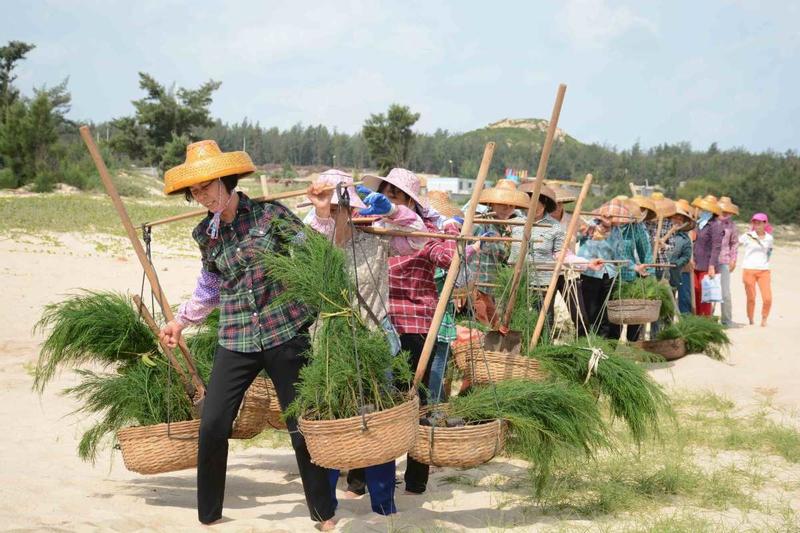All-women tree-planting group persisted when experts said job could not be done
 Tao Fengjiao leads her all-female team members in a greening campaign in Qizi Bay, Hainan province. (PHOTO PROVIDED TO CHINA DAILY)
Tao Fengjiao leads her all-female team members in a greening campaign in Qizi Bay, Hainan province. (PHOTO PROVIDED TO CHINA DAILY)
Through "Hainan-style perseverance", Tao Fengjiao and her band of co-workers, who come from Changjiang in the western part of the island province, have accomplished a striking achievement, planting 5.88 million casuarina trees on 2,250 hectares of barren coastal areas across the tropical island over the past 29 years.
Standing beside Qizi Bay, now a popular tourist destination dotted with trendy hotels and villas, Tao rests her hands on the handle of a shovel and looks into the distance, admiring the emerald-green of the casuarina forest she helped plant, and which she considers as precious as her children.
"Can you imagine that this used to be vast, shifting dunes where, when the wind blew, the sand stung your face and filled your hair, which was hard to clean out again?" she said.
"Now, with the coastal forest acting as a fence, people living by the sea no longer have to be afraid of typhoons. This is the most comforting thing for us," she continued.
Now in her early 60s, Tao has dreamed of growing a "green wall" to fence off the devastating tropical storms since she was a child.
In 1992, a typhoon hit Qizi Bay, destroying fishing boats and claiming the lives of more than 20 fishermen. Constant winds and the encroachment of coastal deserts also caused eye problems and degraded the quality of life for local residents for years.
"A business owner got a contract for a tree-planting project from the Changjiang county government that year, and I immediately joined up, abandoning my fish-selling business, which earned the family a comparatively good living," Tao recalled.
For the sake of their livelihoods and the safety of local residents, Tao and her co-workers continued planting trees after the business owner abandoned the project two years later, when their afforestation efforts failed on the arid western coast, where evaporation rates were often two times higher than the 700 millimeter rainfall the area receives annually.
In 1995, a group of German experts visited Changjiang in search of somewhere to set up an international environmental aid program. According to local officials, they concluded that tree-planting was simply not feasible in the area.
But the women persisted, believing that they could succeed.
With the help of local experts, they attempted to stabilize moving sands by planting thatch screw pine, a small plant that is resistant to salt and sand. Once that was established, they planted casuarina trees, a taller evergreen capable of resisting strong winds.
"This approach greatly improved the survival rate of the saplings, from 10 percent to 80 percent," Tao explained.
They also tried other innovative methods, such as using nutrition bags and water retaining agents, soaking the seedlings, and digging deeper holes for planting.
"The survival rate rose further to 97 percent. The coastal desert began to turn green, bit by bit," Tao recollects happily.
Zhong Yingwei, one of Tao's tree planting "sisters", remembers that the women, then aged between their 20s and 50s, were able to climb the trees to harvest casuarina seeds better than men, and learned to raise the seedlings themselves.
"Transporting the seedlings to where we wanted to plant them was difficult. We had no vehicles or cement roads, so we used shoulder polls to carry 60 to 70 kilograms of saplings at a time, walking barefoot for as far as 50 kilometers a day on scorching sand that made us want to cry," remembers Wen Ying'e, who turns 80 this year.
"Tao knocked on our doors at five o'clock in the morning. We each planted around 400 trees a day. The hot weather often made our food go bad, and our bodies would become swollen from drinking too much water before leaving home," said Zhong.
"It was hard and tiring, but tree-planting was never disappointing. I wanted to give up sometimes when villagers scolded me or threw manure at me if I tried to stop their cattle from eating the casuarina seedlings, or over some other misunderstanding," Tao said.
"Now the villagers all know the benefits of planting trees, and those who used to scold me are polite and friendly," she added.
Though some of the group, which was more than 60-strong in its heyday, left due to the hardship, Tao said she and her co-workers cared for each other like a family, and their tree-planting footprints eventually extended from Changjiang to other parts of the island, including Chengmai, Wenchang and Haikou.
In 2020, Tao was recognized as a National Model Worker for her persistent, innovative efforts in environmental restoration. A memorial hall was built by the county government to commemorate the outstanding contribution of the tree-planting "sisters", and to pass on the green and sustainable development concepts that have brought huge ecological benefit to the community.
"My brother and I are proud every time we patrol the forest. These trees were planted one by one by my mother and her sisters. Now it's time for us to take care of them," Tao's son, Zheng Weijie, said. He has been taking care of the trees with his mother since he was 14 years old and two years ago, he and his elder brother joined the team as professional forest rangers.


